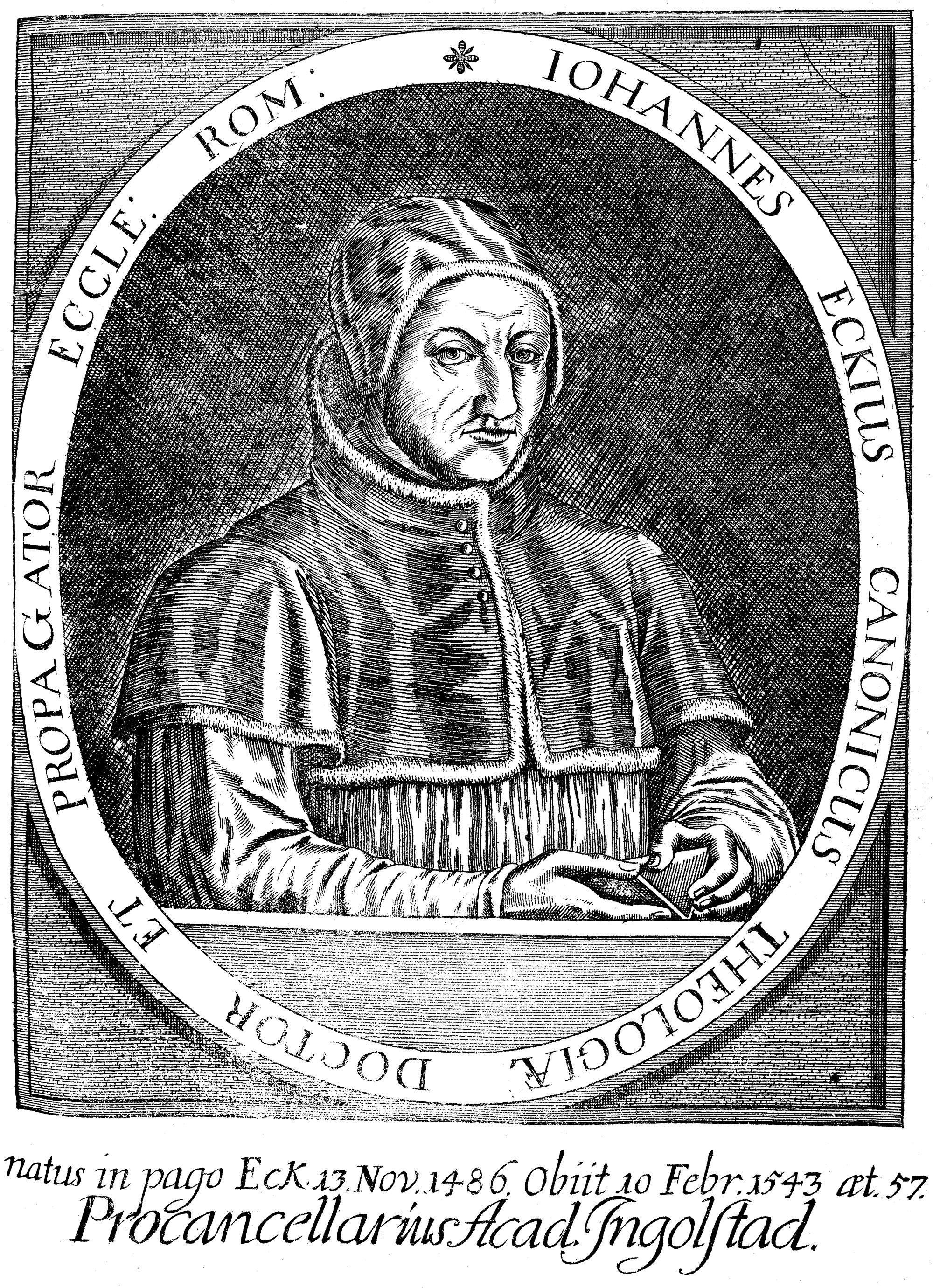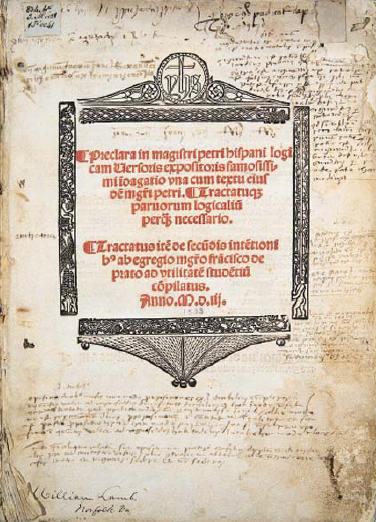|
Johann Eck
Johann Maier von Eck (13 November 1486 – 13 February 1543), often anglicized as John Eck, was a German Catholic theologian, scholastic, prelate, and opponent of Martin Luther. Life Johann Eck was born Johann Maier at Eck (later Egg, near Memmingen, Swabia) and derived his additional surname from his birthplace, which he himself, after 1523, always modified into Eckius or Eccius, i.e. "of Eck". His father, Michael Maier, was a peasant and bailiff, or ''Amtmann'', of the village. The boy's education was undertaken by his uncle, Martin Maier, parish priest at Rottenburg on the river Neckar. At the age of 12 he entered the University of Heidelberg, which he left in the following year for Tübingen. After taking his master's degree in 1501, he began the study of theology under Johann Jakob Lempp, and studied the elements of Hebrew and political economy with . Johann Eck left Tübingen in 1501 on account of the plague and after a year at Cologne finally settled at Freiburg Uni ... [...More Info...] [...Related Items...] OR: [Wikipedia] [Google] [Baidu] |
Egg An Der Günz
Egg an der Günz () is a Municipalities of Germany, municipality in the district of Unterallgäu in Bavaria, Germany. The town has a Municipal association (Germany), municipal association with Babenhausen, Bavaria. References Unterallgäu {{Unterallgäu-geo-stub ... [...More Info...] [...Related Items...] OR: [Wikipedia] [Google] [Baidu] |
Albert Ludwigs University Of Freiburg
The University of Freiburg (colloquially ), officially the Albert Ludwig University of Freiburg (), is a public research university located in Freiburg im Breisgau, Baden-Württemberg, Germany. The university was founded in 1457 by the Habsburg dynasty as the second university in Austrian-Habsburg territory after the University of Vienna. Today, Freiburg is the fifth-oldest university in Germany, with a long tradition of teaching the humanities, social sciences and natural sciences and technology and enjoys a high academic reputation both nationally and internationally. The university is made up of 11 faculties and attracts students from across Germany as well as from over 120 other countries. Foreign students constitute about 18.2% of total student numbers. The University of Freiburg has been associated with figures such as Hannah Arendt, Rudolf Carnap, David Daube, Johann Eck, Hans-Georg Gadamer, Friedrich Hayek, Martin Heidegger, Edmund Husserl, Herbert Marcuse, Friedrich M ... [...More Info...] [...Related Items...] OR: [Wikipedia] [Google] [Baidu] |
Augsburg
Augsburg ( , ; ; ) is a city in the Bavaria, Bavarian part of Swabia, Germany, around west of the Bavarian capital Munich. It is a College town, university town and the regional seat of the Swabia (administrative region), Swabia with a well preserved Altstadt (historical city centre). Augsburg is an Urban districts of Germany, urban district and home to the institutions of the Augsburg (district), Landkreis Augsburg. It is the List of cities in Bavaria by population, third-largest city in Bavaria (after Munich and Nuremberg), with a population of 304,000 and 885,000 in its metropolitan area. After Neuss, Trier, Worms, Germany, Worms, Cologne and Xanten, Augsburg is one of Germany's oldest cities, founded in 15 BC by the Romans as Augsburg#Early history, Augusta Vindelicorum and named after the Roman emperor Augustus. It was a Free Imperial City from 1276 to 1803 and the home of the patrician (post-Roman Europe), patrician Fugger and Welser families that dominated European ban ... [...More Info...] [...Related Items...] OR: [Wikipedia] [Google] [Baidu] |
Political Economist
Politics () is the set of activities that are associated with making decisions in groups, or other forms of power relations among individuals, such as the distribution of status or resources. The branch of social science that studies politics and government is referred to as political science. Politics may be used positively in the context of a "political solution" which is compromising and non-violent, or descriptively as "the art or science of government", but the word often also carries a negative connotation.. The concept has been defined in various ways, and different approaches have fundamentally differing views on whether it should be used extensively or in a limited way, empirically or normatively, and on whether conflict or co-operation is more essential to it. A variety of methods are deployed in politics, which include promoting one's own political views among people, negotiation with other political subjects, making laws, and exercising internal and external f ... [...More Info...] [...Related Items...] OR: [Wikipedia] [Google] [Baidu] |
Aristotle
Aristotle (; 384–322 BC) was an Ancient Greek philosophy, Ancient Greek philosopher and polymath. His writings cover a broad range of subjects spanning the natural sciences, philosophy, linguistics, economics, politics, psychology, and the arts. As the founder of the Peripatetic school of philosophy in the Lyceum (classical), Lyceum in Athens, he began the wider Aristotelianism, Aristotelian tradition that followed, which set the groundwork for the development of modern science. Little is known about Aristotle's life. He was born in the city of Stagira (ancient city), Stagira in northern Greece during the Classical Greece, Classical period. His father, Nicomachus (father of Aristotle), Nicomachus, died when Aristotle was a child, and he was brought up by a guardian. At around eighteen years old, he joined Plato's Platonic Academy, Academy in Athens and remained there until the age of thirty seven (). Shortly after Plato died, Aristotle left Athens and, at the request ... [...More Info...] [...Related Items...] OR: [Wikipedia] [Google] [Baidu] |
Peter Of Spain (author)
__NOTOC__ Peter of Hispania (; Portuguese language, Portuguese and ; century) was the author of the ', later known as the ', an important medieval university textbook on Aristotelian logic. As the Latin ''Hispania'' was considered to include the entire Iberian Peninsula, he is traditionally and usually identified with the Kingdom of Portugal, medieval Portuguese scholar and Hierarchy of the Catholic Church, ecclesiastic Peter Juliani, who was elected Pope John XXI in 1276. The identification is sometimes disputed, usually by Spanish people, Spanish authors, who claim the author of the ' was a Castilian people, Castilian Dominican Order, Blackfriar. He is also sometimes identified as Petrus Ferrandi Hispanus ( 1254 1259). Life The author of the ' is assumed to have studied under John Pagus. Philosophical works There are a large volume of manuscripts and printed editions of the ', indicative of its great success throughout European universities well into the seventeenth c ... [...More Info...] [...Related Items...] OR: [Wikipedia] [Google] [Baidu] |
Predestination
Predestination, in theology, is the doctrine that all events have been willed by God, usually with reference to the eventual fate of the individual soul. Explanations of predestination often seek to address the paradox of free will, whereby God's omniscience seems incompatible with human free will. In this usage, predestination can be regarded as a form of religious determinism; and usually predeterminism, also known as theological determinism. History Pre-Christian period Some have argued that the Book of Enoch contains a deterministic worldview that is combined with dualism. The book of Jubilees seems to harmonize or mix together a doctrine of free will and determinism. Ben Sira affirms free will, where God allows a choice of bad or good before the human and thus they can choose which one to follow. New Testament period There is some disagreement among scholars regarding the views on predestination of first-century AD Judaism, out of which Christianity came. Josephus ... [...More Info...] [...Related Items...] OR: [Wikipedia] [Google] [Baidu] |
Catholicism
The Catholic Church (), also known as the Roman Catholic Church, is the List of Christian denominations by number of members, largest Christian church, with 1.27 to 1.41 billion baptized Catholics Catholic Church by country, worldwide as of 2025. It is among the world's oldest and largest international institutions and has played a prominent role in the history and development of Western civilization.Gerald O'Collins, O'Collins, p. v (preface). The church consists of 24 Catholic particular churches and liturgical rites#Churches, ''sui iuris'' (autonomous) churches, including the Latin Church and 23 Eastern Catholic Churches, which comprise almost 3,500 dioceses and Eparchy, eparchies List of Catholic dioceses (structured view), around the world, each overseen by one or more Bishops in the Catholic Church, bishops. The pope, who is the bishop of Rome, is the Papal supremacy, chief pastor of the church. The core beliefs of Catholicism are found in the Nicene Creed. The ... [...More Info...] [...Related Items...] OR: [Wikipedia] [Google] [Baidu] |
University Of Freiburg
The University of Freiburg (colloquially ), officially the Albert Ludwig University of Freiburg (), is a public university, public research university located in Freiburg im Breisgau, Baden-Württemberg, Germany. The university was founded in 1457 by the House of Habsburg, Habsburg dynasty as the second university in Austrian-Habsburg territory after the University of Vienna. Today, Freiburg is the List of universities in Germany#Universities by date of establishment, fifth-oldest university in Germany, with a long tradition of teaching the humanities, social sciences and natural sciences and technology and enjoys a high academic reputation both nationally and internationally. The university is made up of 11 faculty (division), faculties and attracts students from across Germany as well as from over 120 other countries. Foreign students constitute about 18.2% of total student numbers. The University of Freiburg has been associated with figures such as Hannah Arendt, Rudolf Carna ... [...More Info...] [...Related Items...] OR: [Wikipedia] [Google] [Baidu] |
Strasbourg
Strasbourg ( , ; ; ) is the Prefectures in France, prefecture and largest city of the Grand Est Regions of France, region of Geography of France, eastern France, in the historic region of Alsace. It is the prefecture of the Bas-Rhin Departments of France, department and the Seat of the European Parliament in Strasbourg, official seat of the European Parliament. The city has about three hundred thousand inhabitants, and together Eurométropole de Strasbourg, Greater Strasbourg and the arrondissement of Strasbourg have over five hundred thousand. Strasbourg's functional area (France), metropolitan area had a population of 860,744 in 2020, making it the eighth-largest metro area in France and home to 14% of the Grand Est region's inhabitants. The transnational Eurodistrict Strasbourg-Ortenau Eurodistrict, Strasbourg-Ortenau had a population of roughly 1,000,000 in 2022. Strasbourg is one of the ''de facto'' four main capitals of the European Union (alongside Brussels, Luxembourg ... [...More Info...] [...Related Items...] OR: [Wikipedia] [Google] [Baidu] |
University Of Ingolstadt
The University of Ingolstadt was founded in 1472 by Louis the Rich, the Duke of Bavaria at the time, and its first Chancellor was the Bishop of Eichstätt. It consisted of four faculties: theology, law, artes liberales and medicine, all of which were contained in the ''Hoheschule'' ('high school'). The university was modeled after the University of Vienna. Its chief goal was the propagation of the Christian faith. The university closed in May 1800, by order of the Prince-elector Maximilian IV (later Maximilian I, King of Bavaria). Pre-Reformation In its first several decades, the university grew rapidly, opening colleges not only for philosophers from the realist and nominalist schools, but also for poor students wishing to study the liberal arts. Among its most famous instructors in the late 15th century were the poet Conrad Celtes, the Hebrew scholar Johannes Reuchlin, and the Bavarian historian Johannes Thurmair (also known as "Johannes Aventinus"). The Illuminati ... [...More Info...] [...Related Items...] OR: [Wikipedia] [Google] [Baidu] |
Balthasar Hubmaier
Balthasar Hubmaier (1480 – 10 March 1528) was an influential German Anabaptist leader. He was one of the most well-known and respected Anabaptist theologians of the Reformation. Early life and education He was born in Friedberg, Bavaria, in 1480. Information on his parentage is lacking. He attended Latin School at Augsburg, and entered the University of Freiburg on 1 May 1503. Insufficient funds caused him to leave the university and teach for a time at Schaffhausen, Switzerland. He returned to Freiburg in 1507 and received both a bachelor's and a master's degree in 1511. In 1512, he received a doctor's degree from the University of Ingolstadt under John Eck, and became the university's vice-rector by 1515. Hubmaier's fame as a pulpiteer was widespread. He left the University of Ingolstadt for a pastorate of the Roman Catholic church at Regensburg in 1516. After Maximilian I's death in 1519, Hubmaier helped orchestrate a violent pogrom against Regensburg's Jews, as well ... [...More Info...] [...Related Items...] OR: [Wikipedia] [Google] [Baidu] |







